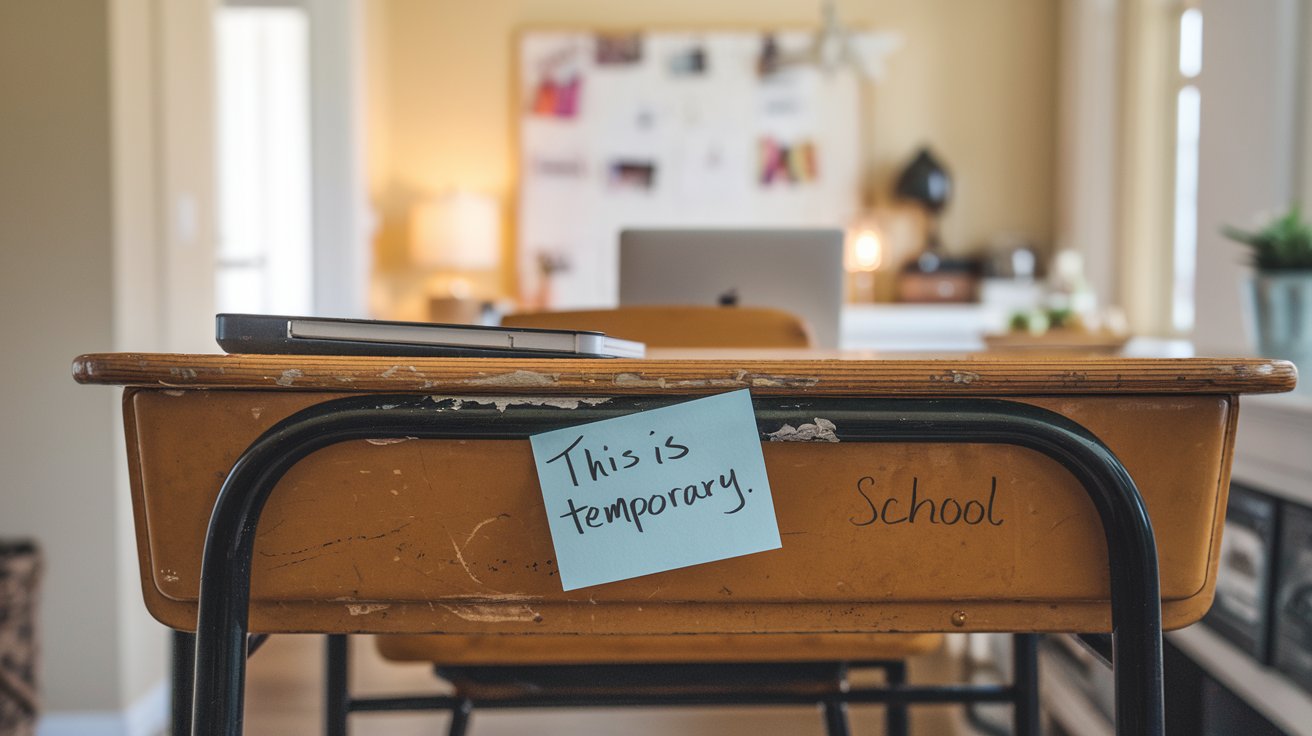Your cart is currently empty!

You Want to Quit Teaching But How Do You Survive?
Feeling trapped in teaching but not ready to leave just yet? You’re not alone. Surviving the job when you’re mentally checked out is tough. But small shifts, like setting boundaries, detaching emotionally, and embracing slow living, can make it more bearable. Here’s how to get through the tough days while you plan your next move.
This post may contain affiliate links. At no cost to you, I may earn a small commission if you click on any affiliate link within my blog. Some of the content on this website was created with the help of AI.
You know you’re done with teaching. You’ve mentally checked out, you daydream about a different life, and the thought of doing this job for years to come makes you want to scream into the void. But for now, like me, you’re still here. So how do we survive when we want to quit teaching?
How do we get through the days without completely burning out?
I know how exhausting it feels to be stuck in a job you’re ready to leave. The good news? There are ways to cope. You can make teaching just a job while you work on your exit plan. Here’s how I’m doing it.

1. Acknowledge That This is Temporary
Right now, teaching might feel never-ending, but it is temporary. This is no longer your forever job, just your for now job.
Shifting your mindset from “This is my whole life” to “This is just a stepping stone” makes a huge difference. You’re not stuck. You’re actively working on your way out. Every tough day is one step closer to the door.
How to Keep Perspective:
- Instead of thinking, “I can’t do this for years”, remind yourself, “I just need to get through this week.”
- Set small milestones toward your exit, even if you don’t have a specific leave date yet.
- Keep a journal or planner where you track progress toward your next chapter.
The more you focus on where you’re going next, the less overwhelming the daily grind feels.
2. Detach Emotionally from the Job
Teaching used to be a core part of your identity. You poured your heart into it. But now? It’s just a job. And that’s okay.
This doesn’t mean you stop caring. It just means you stop over-investing in things that don’t serve you.
- Stop staying late.
- Stop volunteering for unpaid extras.
- Stop losing sleep over things outside of your control.
Repeat this to yourself: I am not my job. My worth isn’t tied to teaching.
Letting go of the emotional weight of teaching is freeing. Your energy is better spent elsewhere, like on your future.

3. Leave Work at Work (Literally & Mentally)
Bringing work home, physically or mentally, keeps you stuck in a cycle of stress. If you want to make teaching feel less overwhelming, you have to set firm boundaries.
Try these strategies:
- No grading at home. Set a cut-off time at school, and whatever doesn’t get done, waits.
- No checking emails after work. Nothing in your inbox is worth sacrificing your peace over.
- Create a “mental clock-out” routine. On the drive home, listen to a podcast, call a friend, or do anything that helps you switch off.
If a thought about work creeps in? Remind yourself: Not my problem until tomorrow.

4. Use Your Work Hours Wisely (Without Doing More Work)
Teaching takes up enough of your energy, so you don’t need to add more to your plate. Instead, focus on using your existing work hours to protect your well-being.
Ways to Make the Most of Your Work Day:
- Use your breaks to actually rest. No guilt. No catching up on work. Just five minutes of peace.
- Leave school as soon as you’re contractually allowed to. No more unpaid overtime.
- Don’t reinvent the wheel. Use pre-made resources, simplify lesson planning, and let go of perfectionism.
- Keep meetings low-energy. If you don’t have to be actively engaged, use the time to brainstorm personal goals or just take a breather.
Small changes like these can help prevent burnout while you’re still in the classroom.

5. Find a Life Outside of Teaching
If teaching is your whole identity, it’s easy to feel trapped. The best way to make your job feel less suffocating? Shift your focus elsewhere.
Instead of thinking, “This job is my life”, start asking: “What else do I enjoy?”
Ways to Reclaim Your Identity Beyond Teaching:
- Start a creative hobby (thrifting, gardening, photography, crafting).
- Join a group or club that has nothing to do with school.
- Read books that inspire you about life outside of education.
- Spend time with non-teacher friends to remind yourself that other careers exist.
When you invest energy into something beyond school, the job itself starts to feel less consuming.
6. Create a Countdown (Even Without a Date Yet)
Even if you don’t have a set leave date, creating a countdown can be a powerful motivator.
Examples of Small Milestones to Track:
- “In three months, I’ll have applied for one non-teaching job.”
- “In six months, I’ll have saved $5,000 toward my transition.”
- “By the end of the year, I’ll have completed an online course in a new field.”
Seeing progress (even tiny steps) helps you feel less stuck.

7. Slow Living as a Teacher: Coping Without Burning Out
When you desperately want to quit teaching but stuck for now, slow living can help you survive the chaos, protect your energy, and make teaching a little more bearable.
Small changes, like slowing down your mornings, creating breathing space in your day, and setting boundaries that protect your energy, can make a draining job feel less overwhelming.
Simple shifts, like finding moments of stillness and letting go of the rush, help make the job less consuming while you work toward your next chapter.
The education system might be fast-paced and chaotic, but you don’t have to be.
Here’s how you can bring slow living into your teaching life, even when it feels impossible.
Slow Down Your Mornings (Before Work Takes Over)
Most teacher mornings are a blur. Getting your own kids ready, rushing out the door, already thinking about emails and to-do lists. But what if your morning felt calm instead?
Try these small shifts:
- Give yourself 5–10 minutes of stillness before the day begins. No phone. Just sit with a cup of coffee or tea.
- Stop checking emails before you even get to school. Protect your mental space in the morning.
- Create a peaceful getting-ready routine. Play soft music, use a nice-smelling hand cream, whatever makes you feel human before work mode kicks in.
You don’t need an hour-long morning ritual. Just a few intentional moments of slowness can set a different tone for the day.
Approach the Workday with Less Urgency
Teaching can feel like a never-ending race, there’s always something to do, someone who needs you, and a system that expects you to give endlessly.
But here’s the truth: You don’t have to operate at full speed all the time.
- Set a small intention for the day (e.g., “I will stay calm,” “I will focus on what I can control”).
- Breathe before you enter the classroom. Just one deep inhale. A moment of stillness and mindful breathing before the chaos.
- Move at your own pace, even when things feel rushed. Not everything is an emergency.
- Give yourself permission to pause. If you have a moment between classes, sit down. Sip water. Look out the window.
Slowing down doesn’t mean slacking off, it means refusing to let the job steal every ounce of your energy.
Bring Moments of Calm Into Your Classroom
Your classroom might be loud, busy, and filled with endless distractions. But you can still create pockets of peace within that space.
Try this:
- Dim the harsh fluorescent lights and use softer lamps when possible.
- Play calming instrumental music when students work independently.
- Create a small teacher-only space – even if it’s just a corner of your desk with a plant, a candle (unlit!), maybe some battery powered fairy lights or something that feels yours.
- Take one-minute reset moments throughout the day. Step into the hallway. Stretch your shoulders. Take a breath.
You spend so many hours in the classroom, it should be a place that doesn’t drain you.
Set Hard Boundaries Between Work and Home
One of the biggest energy-drainers? Letting teaching bleed into your personal life.
If you want to slow down and reclaim your time, start here:
- No school emails after work. Set a cut-off time and stick to it.
- Take your lunch break away from work. Go outside, sit in your car, anything that gives you a moment of separation.
- Have a “clock-out” routine. Change into comfy clothes, light a candle, take a short walk, anything that signals the workday is done.
Your time is yours. Work doesn’t deserve all of it.
Make Evenings a Time to Reset
You’ve given enough of yourself during the day. Evenings should be a time to slow down and recharge, not catch up on grading or worry about tomorrow’s lesson.
Ways to Unwind After Work:
- Make a warm drink and enjoy it without multitasking.
- Take a long shower or bath to rinse off the workday stress.
- Read a book (not about teaching) instead of scrolling through teacher social media accounts that stress you out.
- Do something creative – journal, paint, bake – anything that feels like you.
The goal? End the day feeling like a person first, a teacher second.
When you intentionally slow down, teaching feels less chaotic, even when the system itself is overwhelming.
Want More Slow-Living Tips for Teachers?
If you’re craving a slower, calmer approach to teaching, I’ve written more posts on exactly this.
Read Next: A Teacher’s Guide to Slow Living
Or get my free guide by clicking on this link:
Because teaching shouldn’t feel like it’s swallowing your whole life. And you deserve to feel at peace, even while you’re still in the classroom.

Conclusion
I won’t lie. Some days, teaching feels unbearable. The exhaustion, the frustration, the feeling of being trapped in a job that no longer fits. But what’s keeping me going is knowing that this is temporary. Every small step I take, whether it’s setting boundaries, working on my blog, or embracing slow living, is a step toward the future I actually want.
I don’t have an exact exit date yet, but I do have a plan. And that’s what keeps me from drowning in the day-to-day stress of teaching. I remind myself: This job isn’t my forever – it’s just where I am right now.
If you’re feeling the same way, know that you’re not alone.
You might not be able to quit tomorrow, but you can make teaching more bearable while you plan your escape.




Leave a Reply